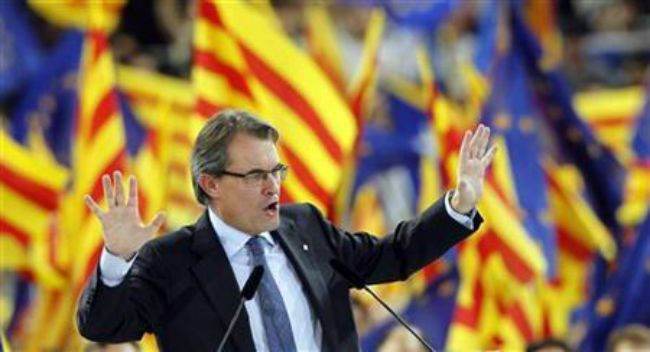
Voters in Spain's Catalonia region go to the polls on Sunday and are likely to elect a pro-independence leader who will test Spanish unity at a time of deep economic crisis.
Opinion polls show two-thirds of voters in this region on the French border will cast ballots for parties, both rightist and leftist, that want Catalan independence from Spain.
Catalan President Artur Mas will likely win re-election since his conservative Convergence and Union party is forecast to take a majority, some 62 to 64 seats, in the 135-seat regional assembly, or Parliament.
Frustration over high unemployment and a deep recession have fueled a separatist resurgence in Catalonia, where polls show that for the first time more than half of the people want to break away from Spain.
Many Catalans believe their economy would be more prosperous on its own, complaining that a high portion of their taxes go to the central government in Madrid.
Mas, who adopted the independence cause in September after a massive street demonstration, campaigned on a promise to hold a referendum on secession.
If he carries through with the pledge, it will put him on a collision course with Madrid, where Prime Minister Mariano Rajoy will use the constitution to block a referendum.
"Catalonia has never faced elections this important," Mas said at a campaign rally this week. He told supporters he wanted to be the last president of Catalonia within Spain.
A strong mandate for Mas and other Catalan independence leaders from the left will undermine Rajoy's mission to persuade investors of Spain's fiscal and political stability.
Spain's deep recession and high public deficit have put it at the heart of the euro zone debt crisis and the government's borrowing costs are painfully high.
Alicia Sanchez-Camacho, the candidate for Rajoy's People's Party in Catalonia has campaigned on a message that leaving Spain and the European Union would lead to economic disaster. The PP is vying to be the second biggest party in the Catalan Parliament with opinion polls forecasting it will win 17 seats.
"Don't stay at home (on election day) if you don't want them to kick us out of Spain and out of Europe," she said at a campaign rally this week.
Polls open at 0800 GMT and close at 1900 GMT.
IDENTITY AND ECONOMY
In the rest of Spain the Catalan secession drive is viewed with disbelief and suspicion. Many Spaniards fear that if Catalonia moves to break away, the Basques could soon follow.
Like Basques, Catalans speak their own language and have always seen themselves as distinct from the rest of Spain.
The land of surrealist painter Salvador Dali and architect Antoni Gaudi prides itself on a regional character that blends pragmatism and idealism.
Home to car factories and banks that generate one fifth of Spain's economic wealth, Catalonia also has one of the world's most successful football clubs, FC Barcelona.
This year at Barcelona's famous Camp Nou stadium fans started a new tradition. They chant "independence" at every game when the clock hits 17 minutes and 14 seconds - 1714 being the last year that Catalonia was under the Crown of Aragon before the Bourbon King Philip V united most of what is now Spain into one kingdom.
Catalan independence movements have waxed and waned over the centuries. Secessionism had been politically dead since Spain returned to democracy and gave its 17 autonomous regions significant self-governing power in the 1978 Constitution.
But now there is a widespread perception among Catalans that autonomy did not go far enough and the region is treated unfairly. Most supporters of Mas's CiU party say the tax system drains resources from their region and that Madrid has refused to negotiate improvements.
Even though the Catalan treasury is broke and Mas has had to cut spending on schools and hospitals, many people in the region still blame Madrid for their woes.
"It's like a marriage, when things are good then everything is fine, but when things go bad then you see if there really is any love there," said Elias Banares, the 35-year-old owner of a shop that sells prams. He plans to vote for CiU.
The political mood has driven demand for "esteladas," a flag that symbolises the independence movement, with a lone star against the red and yellow stripes of the official Catalan banner.
The "estelada," once too politically risky for most Catalans to fly, now waves all over the Catalan capital, the Mediterranean port city of Barcelona.
"In two weeks we've sold more than in the last eight years. Amazing figures," said Margarita Bascompte, owner of a family business that makes the flags in the city of Vic, in the heart of the most pro-independence province of Catalonia.
© Thomson Reuters.




